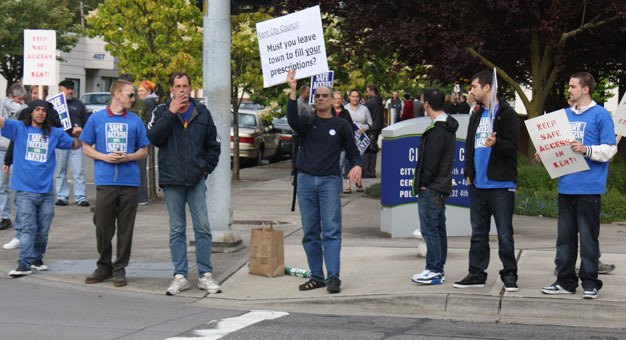The showdown between medical marijuana supporters and the city of Kent isn’t over yet despite a 4-3 vote by the City Council to ban medical cannabis collective gardens.
Most of the more than 150 people who packed City Hall Tuesday night wanted the council to vote against a proposed ban. They left disappointed but promised the fight will go on.
Charles Lambert, owner of Evergreen Association of Collective Gardens, said his attorney Doug Hiatt would file a lawsuit in an effort to allow his business to stay open.
“One way or the other, I’m not closing,” said Lambert during an interview outside of City Hall after the council vote. “I cannot see the City Council rewriting state law. That is against the law. Here I am, and I am ready for the fight.”
Steve Sarich, executive director of the Cannabis Action Coalition, delivered copies of a lawsuit to Mayor Suzette Cooke at the Tuesday meeting. The suit seeks to prohibit the city from enforcing its ban on collective gardens because the state regulates medical marijuana collectives, and cities cannot enforce federal law over state medical marijuana laws.
Deputy city attorney Pat Fitzpatrick said the two businesses operating in Kent as collective gardens already are in violation of a six-month moratorium passed by the council in January. The new ordinance, which bans medical marijuana collective gardens because marijuana is illegal under federal law, goes into effect June 13. If the businesses remain open, the city will consider its next step, which could include asking a judge to close the collective gardens.
“The next step might involve legal action to enforce the ban,” Fitzpatrick said during a phone interview Wednesday. “We’ll ask the court to enjoin the businesses from violating the city ordinance.”
Lambert said state law allows him to operate. He disagreed with the councilmembers who stated that because marijuana is illegal under federal law the city cannot allow businesses to sell medical marijuana.
“They’re using federal law as an excuse to override state law, which they do not have the authority to override state law,” Lambert said. “City law follows state law.”
Councilmembers Bill Boyce, Dana Ralph, Les Thomas and Deborah Ranniger voted for the ban. Council President Dennis Higgins and councilmembers Jamie Perry and Elizabeth Albertson voted against the ordinance.
“I cannot get beyond the federal law,” Boyce said at the meeting. “Deep down in my heart I just don’t feel this is a city issue.”
Boyce encouraged medical marijuana backers to take their efforts to change laws at the federal and state levels. He added that the state law is unclear about collective gardens but the federal law is clear that marijuana is a controlled substance under the federal Controlled Substances Act.
“I belief in my heart there are patients out there who get relief from medical marijuana,” Boyce said. “But right or wrong, the thing for me is when I took office in January I took an oath to uphold the law, federal law, state law and laws in the city of Kent. I am who I am and I take the law very seriously.”
Albertson said she wanted people to have access to medical marijuana in the city. She preferred to see Kent allow collective gardens despite what the federal law reads.
“The first step for making change starts locally,” Albertson said. “Never doubt that a small group of people have the ability to make change. It always starts locally.”
Ralph agreed with Boyce that the city must follow federal law and that medical marijuana supporters need to work to pass new laws at the state and federal level.
“You need to change the law because you have a valid use,” Ralph said. “Until that’s done, I can’t support something for zoning that’s against the law.”
Higgins opposed the ban on collective gardens.
“I know what the federal law says and what the schedule says but I feel that law is irreparably broken,” Higgins said. “And a lot of other people think that law is broken, too.”
Thomas and Ranniger didn’t comment at the meeting about why they supported the ban. Both had commented and supported the ban at council committee meetings earlier this year.
Perry agreed with Albertson and wanted Kent to start the change at the city level. Perry, Albertson and Higgins supported zoning regulations to allow collective gardens in a vote that failed in January to get a majority.
“I think there is a reasonable way to do this,” Perry said. “I think there are reasonable regulations that we could pass to make sure that people who truly need this have access.”
About 20 people testified prior to the vote, most of them against the ban.
The city of Pasco passed a similar ban Monday on medical marijuana collective gardens.
Talk to us
Please share your story tips by emailing editor@kentreporter.com.
To share your opinion for publication, submit a letter through our website https://www.kentreporter.com/submit-letter/. Include your name, address and daytime phone number. (We’ll only publish your name and hometown.) Please keep letters to 300 words or less.

